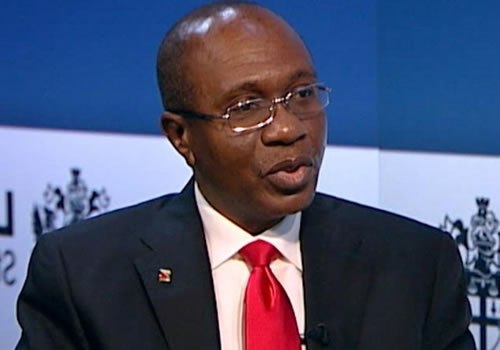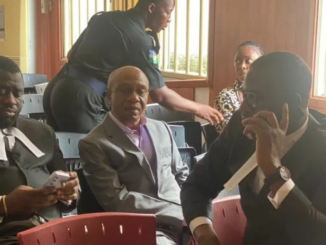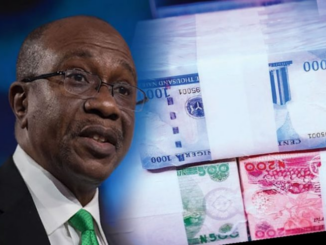
The Federal Government has for the third time amended the criminal charges it filed against the immediate-past Governor of the Central Bank of Nigeria, Godwin Emefiele.
In the latest amended charge taken before Justice Hamza Muazu of the Federal Capital Territory High Court in Abuja on Thursday, the Economic and Financial Crimes Commission accused Emefiele of impersonating the Secretary to the Government of the Federation to illegally obtain a sum of $6.2m.
According to the amended charge marked CR/577/2023, Emefiele, on February 8, 2023, connived with one Odoh Ocheme, who is now on the run, to obtain $6.2m from the CBN, claiming that it was requested by the SGF “vide a letter dated 26th January 2023 with Ref No. SGF.43/L.01/201.”
According to the EFCC, Emefiele allegedly claimed that the SGF requested the CBN to release “a contingent logistic advance in the sum of $6,230,000.00 in line with Mr. President’s directive.”
The EFCC said Emefiele made the claim despite knowing that it was false “and you thereby committed an offence contrary to section 1(1) of the Advance Fee Fraud and Other Fraud Related Offences Act, 2006, and punishable under section 1(3) of the same Act.”
Still in the amended charge, the anti-graft agency alleged that Emefiele, in January 2023, forged a document titled: “RE: PRESIDENTIAL DIRECTIVE ON FOREIGN ELECTION OBSERVER MISSIONS,” dated 26 January 2023 with Ref No. SGF.43/L.01/201.
He said to have allegedly connived with the fleeing Ocheme to commit the “illegal act to wit: forgery.”
Furthermore, Emefiele was accused of conferring corrupt advantage on his wife, Omoile Margret, and brother In-law, Omoile Macombo, by allegedly awarding a contract for the renovation of a portion of the CBN Governor’s residence in Lagos to the tune of N99.8m.
The anti-graft agency alleged that the contract for the renovation of the CBN Governor’s lodge, located at No. 2 Glover Road, Ikoyi, Lagos, was awarded to a company named Messrs. Architekon Nigeria Limited, “wherein the duo are directors and majority shareholders.”
The EFCC said Emefiele’s alleged action was a violation of Section 19 of the Corrupt Practices and Other Related Offences Act 2000.
The amended charge sheet contains a total of 20 counts against Emefiele.
Justice adjourned till today (Friday) for Emefiele to take his plea on the amended charges.
In the original charge filed against him in August 2023, Emefiele was accused of perpetrating procurement fraud to the tune of N6.5bn.
He was then charged alongside a female CBN employee, Sa’adatu Yaro, and her company, April 1616 Investment.
The EFCC later amended the charge by reducing the counts to six, removing the names of Yaro and April 1616 Investment, while the quantum of the alleged procurement fraud was reduced to N1.2bn.
Emefiele was arraigned on the second charge on November 29, 2023, and he pleaded not guilty.
The EFCC subsequently opened its trial and had so far called three witnesses before the latest amendment.
Meanwhile, the court on Thursday, varied the terms attached to the N300m bail granted Emefiele on November 22, 2023.
Justice Muazu removed the condition that Emefiele must be restricted to Abuja till the end of the trial.
The decision followed an application to that effect moved by the defence counsel, Mathew Bukka (SAN).
The PUNCH reports that Justice Muazu in November last year granted Emefiele N300m bail with two sureties in like sum.
The judge said the sureties must have landed property in the Maitama District of the FCT.
He also ordered the ex-CBN governor not to leave the court’s jurisdiction and directed him to deposit all his travel documents with the court.
At the proceedings on Thursday, Bukka urged the court to lift the restriction on his client, assuring that he would not jump bail if the restriction was lifted.
The EFCC prosecutor, Rotimi Oyedepo (SAN), did not oppose the request.
He only urged the court to ensure that Emefiele wrote an undertaking that he would remain in the country if his plea was granted.
“From experience, we have seen cases where travel documents are with the court and the defendant will travel out of the country. What they usually do is go to the immigration and depose an affidavit that their traveling documents are missing.
“So in addition to his traveling documents being with the court, he should write an undertaking that the defendant will remain in Nigeria for the duration of his trial. I am not in any way suggesting the defendant will jump bail,” Oyedepo said.



